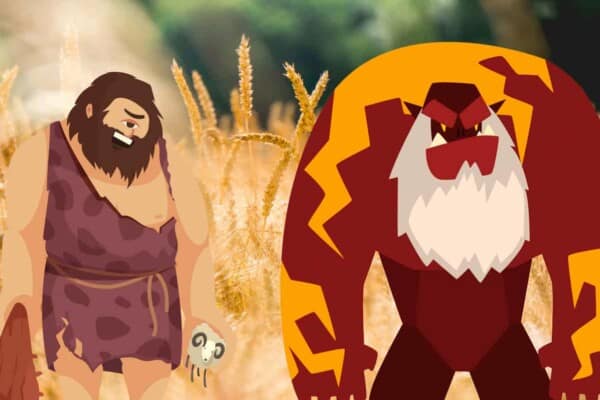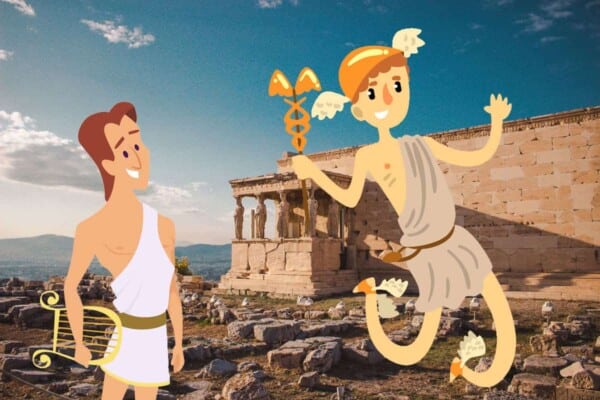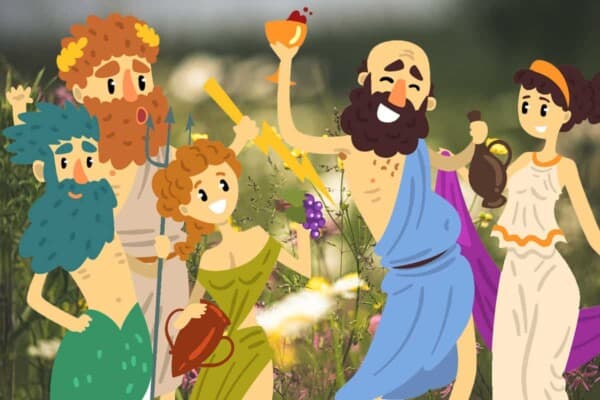Aphrodite is a name familiar to most people. She is strongly associated with the themes of beauty and love. But there is a great deal more to this highly interesting Greek goddesses. Aphrodite features in a varied mixture of stories and it’s worth exploring her impact further.
So, lets get to it and discover some of those stories and myths, and find out a little more about Aphrodite.
Aphrodite Myths and Stories
The Birth of Aphrodite
Gaia (earth) and Uranus (sky) were known to have had many children together. They had monster children that were called the hundred-hand giants and the Cyclopes. They also had 12 children that were human in appearance and called the Titans. Gaia loved her children very much, including the monstrous ones. But, Uranus hated them so he locked them up in the Underworld.
Gaia didn’t like this, so she convinced her Titan children to attack their father and dethrone him. Her son Cronus castrated his father and some of his blood landed in the sea. From that blood, Aphrodite, the goddess of love was born, as were the Furies and the giants. Cronus ended up imprisoning Uranus in the Underworld and freeing his brothers from their captivity.
Aphrodite was a well-known goddess who plays major parts in many different encounters between the gods and humans. The Furies and the giants also played substantial roles, although they were known to torment and shed the blood of humans.
The Island of Lemnos and Aphrodite
The island of Lemnos was full of women who Aphrodite had given a very strange smell to. It ended up driving away their husbands which angered the women. They ended up killing their husbands and the rest of the men on the island in retaliation. But, eventually they missed having men around.
This worked in favor of the Argonauts and their leader Jason who happened upon the island during one of their adventures. Because the women missed their men terribly, the god Hephaestos stepped in and convinced Aphrodite to take away the horrible stench from the women. Without the disgusting smell, the women kept the Argonauts entertained for a year while they repopulated the island.
This myth shows that Aphrodite could be a vengeful but reasonable goddess. She may be rash in her decision making, but she could be reasoned with.
The Trojan War and Aphrodite
The goddess of discord, Eris, was angry she had not been invited to the wedding of the sea nymph, Thetis. She decided to cause some discord by throwing a golden apple to the guests. The apple was written with the phrase, “for the fairest goddess of all.” The goddesses Hera, Athena, and Aphrodite all thought the apple was for them.
They wanted Zeus to judge who the apple should be for. Zeus didn’t want to make this decision, so he came up with another idea. He would have a young man named Paris make the judgment for him. The goddesses sought Paris out and each promised him something in return for picking her. Aphrodite promised Paris that if he chose her, she would give him the love of the most beautiful woman in the world. Paris couldn’t turn this offer down so he chose Aphrodite. The woman she had promised him was Helen, the wife of King Menelaus of Sparta.
If Aphrodite had not been chosen by Paris to receive the golden apple, then the Trojan war may have never started. But, because she was chosen and Helen was the prize, the Trojan war was fought as a means of getting Helen back.
The Love of Aphrodite and Adonis
Adonis was known to be a very handsome young man. He was born from a tree and Aphrodite fell in love with him right away. The queen of the Underworld, Persephone, also took a fancy to Adonis. Zeus decided that to be fair, Adonis would spend half the year with Aphrodite, and the other half of the year with Persephone.
Unfortunately, while Adonis was spending time with Aphrodite, he was killed by a boar. Aphrodite was so stricken with grief, that she ended up turning the blood he had lost into a blood-red sea anemone.
Being the goddess of love, Aphrodite was well known for her epic love affairs. Her affair with Adonis ended up making him pretty famous, as he ended up being a minor god who was worshipped by Greeks at the beginning of the 5th century.
Atalanta and Aphrodite
Atalanta was a beautiful woman who was raised by bears. She was capable of racing or fighting as well as any man. One day, she fell in love with a man named Meleager, but his mother ended up killing him because she didn’t like him and Atalanta being involved with one another. Atalanta swore she would never marry, even though she had many men courting her.
To keep these men busy and away from her, she came up with a plan. She told them she would marry the first man who beat her in a race, and anyone who lost to her would be killed. Many men ended up losing to her, except for one man named Hippomenes. He was smart enough to pray to Aphrodite before he began the race. Aphrodite gave him three apples and told him to drop them while he was racing Atalanta. He listened to Aphrodite’s advice, and the apples ended up distracting Atalanta. Hippomenes ended up winning the race.
This myth shows Aphrodite’s playful or matchmaking side. Being the goddess of love, she was always willing to help those who pined for someone’s attention.
Eos and Aphrodite
Eos was known as the goddess of dawn. She was the sister of the son god, Helios. Aphrodite was incredibly jealous of Eos because the god of war, Ares, had taken quite a liking to her. Aphrodite decided to curse Eos. Eos would only fall in love with mortal men. Eos would go down to earth and find a man. She would then carry him away to her palace.
This would have been completely fine, had it not been for the fact that no mortal man would survive for very long. While Eos remained young and beautiful, her lover would wither, grow old, and die. She was forever cursed to lose her lovers.
This myth shows the vengeful side of Aphrodite. While love can be a wonderful thing, it can also be one of the most harmful. Aphrodite was never afraid of using love to punish those she saw fit.
Helen and Aphrodite
Helen was the queen of Sparta. She was known to be the daughter of Zeus and the mortal woman, Leda. One day, Aphrodite visited Helen in a dream. She was told that she had been given to the man Paris as a prize for him giving Aphrodite the golden apple. Aphrodite went on to teach Helen seduction techniques that only Aphrodite knew about.
Helen became even more attractive than she already was. When Paris took Helen to Troy, it was apparent there would absolutely be a war to get her back. Paris’ brothers all fell in love with her as well and were refusing to give her back to Sparta.
With Aphrodite’s influence in the Helen and Paris situation, some could say it was actually Aphrodite who was the root cause of the Trojan war. Without her complete involvement in 1. Paris choosing her over the other goddesses and 2. Teaching Helen the ways of womanly seduction, the Trojan war may have never happened.
Pasiphae and Aphrodite
Pasiphae was the daughter of the sun god, Helios, and was wife to King Minos. One day, she happened to offend Aphrodite, as she claimed that she was much more beautiful than Aphrodite. The goddess didn’t take kindly to someone saying she was more beautiful than her, so Aphrodite came up with a plan.
She made Pasiphae fall in love with one of King Minos’ prized bulls. She and the bull had an affair and Pasiphae ended up becoming pregnant. Their offspring was none other than the minotaur. The minotaur angered King Midos so much that he locked him away in a specially designed labyrinth.
The significance of this myth is that by creating the Minotaur, the Greek hero, Theseus’ life was influenced. He was sent to King Minos as a sacrifice to the Minotaur. But, with the help of King Minos’ daughter, Ariadne, who had fallen in love with Theseus, she was able to help him through the maze where he ended up killing the minotaur.
Final Thoughts
Aphrodite is an interesting Greek goddess. She has both an adventurous and sometimes wicked side to her personality. This is pretty common with the Greek gods. They were designed to be fallible, much like the humans they ruled over.
If you have any comments then please be sure to post them in the comments section below. Thanks for taking the time to read through this deconstruction of Aphrodite.













